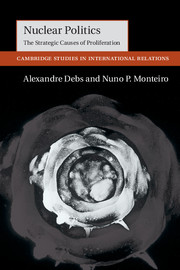Crossref Citations
This Book has been
cited by the following publications. This list is generated based on data provided by Crossref.
Debs, Alexandre
and
Monteiro, Nuno P.
2017.
Conflict and Cooperation on Nuclear Nonproliferation.
Annual Review of Political Science,
Vol. 20,
Issue. 1,
p.
331.
Onderco, Michal
2017.
Why nuclear weapon ban treaty is unlikely to fulfil its promise.
Global Affairs,
Vol. 3,
Issue. 4-5,
p.
391.
KOSTRZEWA-ZORBAS, Grzegorz
2017.
NEW TECHNOLOGY AND NEW GEOPOLITICS - THIRD AND FOURTH THESES ON POLAND'S SECURITY CONDITIONS.
National Security Studies,
Vol. 11,
Issue. 1,
p.
77.
Craig, Campbell
and
Radchenko, Sergey
2018.
MAD, not Marx: Khrushchev and the nuclear revolution.
Journal of Strategic Studies,
Vol. 41,
Issue. 1-2,
p.
208.
Ko, Jiyoung
2019.
Alliance and Public Preference for Nuclear Forbearance: Evidence from South Korea.
Foreign Policy Analysis,
Vol. 15,
Issue. 4,
p.
509.
Long, Austin G.
and
Shifrinson, Joshua R.
2019.
How long until midnight? Intelligence-policy relations and the United States response to the Israeli nuclear program, 1959–1985.
Journal of Strategic Studies,
Vol. 42,
Issue. 1,
p.
55.
Craig, Campbell
2019.
Solving the nuclear dilemma: Is a world state necessary?.
Journal of International Political Theory,
Vol. 15,
Issue. 3,
p.
349.
Hirose, Kentaro
and
Kurizaki, Shuhei
2019.
The Logic of the Survival of North Korea.
Asian Economic Policy Review,
Vol. 14,
Issue. 2,
p.
287.
Winter, Paul
and
Lenine, Enzo
2020.
Survival of the best fit: modelling nuclear proliferation.
International Interactions,
Vol. 46,
Issue. 5,
p.
832.
Herzog, Stephen
2020.
The Nuclear Fuel Cycle and the Proliferation “Danger Zone”.
Journal for Peace and Nuclear Disarmament,
Vol. 3,
Issue. 1,
p.
60.
Lee, Dong Sun
Alexandrova, Iordanka
and
Zhao, Yihei
2020.
The Chinese failure to disarm North Korea: Geographical proximity, U.S. unipolarity, and alliance restraint.
Contemporary Security Policy,
Vol. 41,
Issue. 4,
p.
587.
Kim, Jeehye
and
Ko, Jiyoung
2020.
To condone, condemn, or ‘no comment’? Explaining a patron’s reaction to a client’s unilateral provocations.
Journal of Peace Research,
Vol. 57,
Issue. 3,
p.
452.
Gibbons, Rebecca Davis
2020.
Supply to Deny: The Benefits of Nuclear Assistance for Nuclear Nonproliferation.
Journal of Global Security Studies,
Vol. 5,
Issue. 2,
p.
282.
Smith, Bradley C
and
Spaniel, William
2021.
Do nonproliferation agreements constrain?.
Journal of Peace Research,
Vol. 58,
Issue. 6,
p.
1163.
Lee, Dong Sun
and
Alexandrova, Iordanka
2021.
North Korean nuclear strategy: envisioning assured retaliation.
International Relations of the Asia-Pacific,
Vol. 21,
Issue. 3,
p.
371.
Mattiacci, Eleonora
2021.
How Nuclear Issue Salience Shapes Counterproliferation.
Global Studies Quarterly,
Vol. 1,
Issue. 3,
Koch, Lisa Langdon
2022.
Holding All the Cards: Nuclear Suppliers and Nuclear Reversal.
Journal of Global Security Studies,
Vol. 7,
Issue. 1,
Mattiacci, Eleonora
Mehta, Rupal N.
and
Whitlark, Rachel Elizabeth
2022.
Atomic Ambiguity: Event Data Evidence on Nuclear Latency and International Cooperation.
Journal of Conflict Resolution,
Vol. 66,
Issue. 2,
p.
272.
Saha, Aniruddha
2022.
Nuclear Stigma and Deviance in Global Governance: A New Research Agenda.
International Studies Quarterly,
Vol. 66,
Issue. 3,
Spaniel, William
2022.
Scientific intelligence, nuclear assistance, and bargaining.
Conflict Management and Peace Science,
Vol. 39,
Issue. 4,
p.
447.





